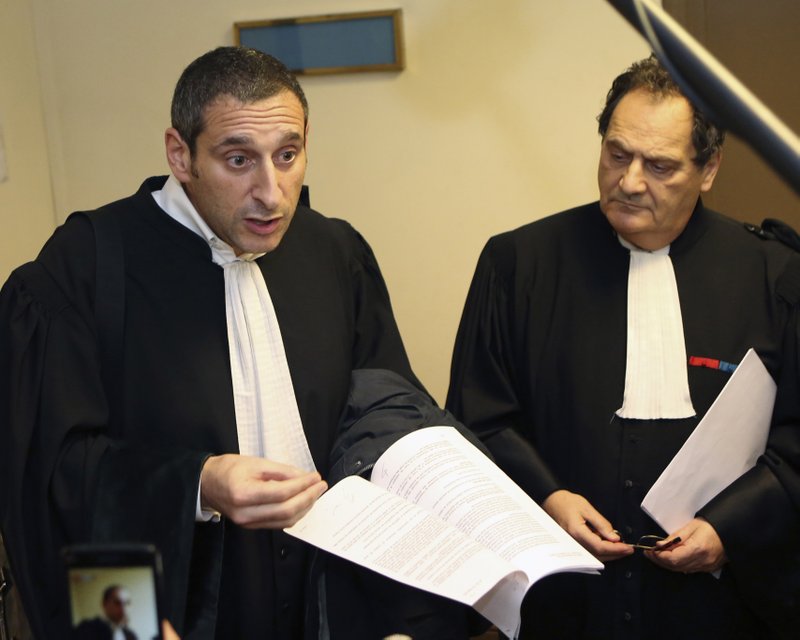PARIS -- A French court ruled Friday that Uber's ride-hailing service may infringe French law and ordered the company to make changes to its popular mobile app-based service.
However, the court did not ban the popular service, which was launched earlier this year in France and matches people seeking rides with drivers through a mobile phone app.
The Paris Commercial Court said Friday that it is ordering Uber to withdraw from its app to French users "all mention suggesting it is legal" for Uber's drivers to act like taxis -- that is, driving around and waiting for clients.
The court also said it is up to a French criminal court to decide if Uber should be fined.
Earlier this year, in a case brought by taxi and limousine companies, Uber was convicted by the criminal court of engaging in misleading commercial practices. The ride-hailing service is appealing the verdict, but a ruling is not expected for several months.
Uber did not immediately return calls seeking comment about Friday's ruling.
Maxime de Guillenchmidt, a lawyer representing limousine companies that brought the commercial court lawsuit, said they are only partially satisfied by its verdict. "We wanted the court to immediately order Uber to stop this service, which infringes the law," Guillenchmidt said. "Uber has won time during which they will win lots of market share."
The decision in France involving Uber operations is one of many the company and other ride-sharing companies such as Lyft have been involved with around the world. Taxi drivers argue the newer car services have an unfair advantage because they don't have to follow the same regulations and can afford cheaper prices.
In Spain, a judge ordered Uber to temporarily suspend its operations, saying it represents unfair competition. The Madrid commercial court judge said this week in a preliminary ruling that Uber drivers lacked proper permits to transport passengers in Spain. The suspension was sought by Madrid's Taxi Association, which is planning legal action against Uber.
And in India, New Delhi police say there's a possibility of criminal charges against the company if police find evidence it misrepresented the safety of its service. A top government official has called for Uber to be banned nationwide after one of its drivers was accused of rape in New Delhi, which has already banned the service.
A Dutch court has ruled in a preliminary judgment that Uber must stop working with drivers who charge fares but do not possess a taxi license. The Commercial Appeals Court in The Hague sided with the Ministry of Transportation in saying that Uber's UberPop service violates current taxi laws, which are under review. The court rejected a proposal by Uber to allow UberPop to operate until the actual case is decided -- a process likely to take more than a year.
Uber is drawing similar scrutiny in the United States, as well.
Uber is cooperating with Chicago police in an investigation into a customer's report that she was sexually assaulted during a ride last month.
The woman told police an Uber driver picked her up at a bar, asked her to get in the front seat and attacked her during the ride. The driver was working on the company's low-cost UberX platform, in which customers use their smartphones to hail rides from individuals who drive their own vehicles. The state House and Senate this month approved legislation creating statewide regulations for drivers working with ride-sharing services. It includes modified insurance requirements, background checks, and a zero-tolerance policy on drugs and alcohol.
California prosecutors have sued Uber over the company's background checks on drivers and other allegations, saying it engages in false advertising about its background checks. Competitor Lyft has agreed to drop similar claims that its background checks are the "best available." It also agreed to pay $500,000 and change some practices to settle its own lawsuit.
And, Portland, Ore., city officials sued Uber this week, asking a judge to order it to cease operations only days after the service was launched. The city's Transportation Bureau issued two civil penalties against Uber, one for operating without a company permit and another for operating without a vehicle permit.
Little Rock city directors in late November approved an emergency clause to implement a new transportation network companies ordinance to allow Uber and other ride-sharing companies to begin charging fees for their services.
The new ordinance sets a $5,000 permit fee for a transportation network company and requires a driver to register with the city for a free city permit; place a sign on the vehicle to show he's operating legally; and carry insurance -- $250,000 for injury or death and $500,000 liability. Uber said it would provide a $1 million commercial insurance policy.
Information for this article was contributed by Bastien Inzaurralde of The Associated Press and staff members of the Arkansas Democrat-Gazette.
Business on 12/13/2014
